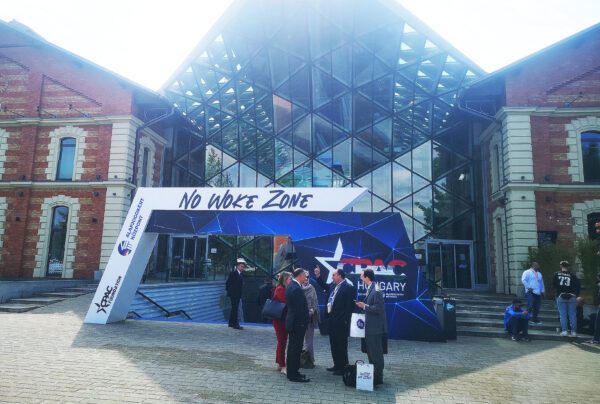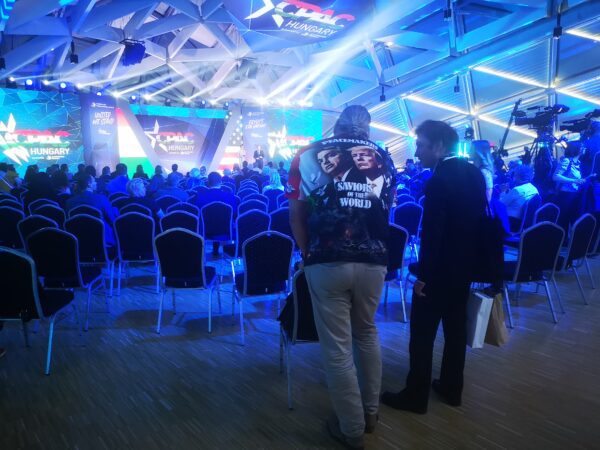Report on CPAC Hungary 2023
Augustin Goland, American Renaissance, June 2, 2023
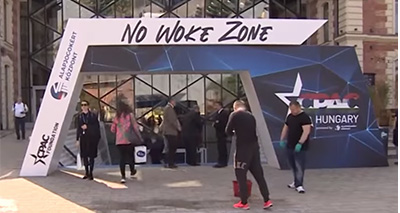
Subscribe to future audio versions of AmRen articles here.
It is no coincidence that the only European edition of America’s Conservative Political Action Conference (CPAC) took place in Hungary this year — for the second year in a row. Hungary is a small country, even by European standards, with Hungarians living in their homeland counting for fewer than 10 million of the European Union’s 447 million inhabitants. What’s more, it has a surface area that was reduced by over two-thirds by the Treaty of Trianon, imposed by the Entente after the First World War on a nation that bore no responsibility for starting that war. That left a third of Hungarians living outside their truncated homeland. Still, this thousand-year-old nation has kept the identity of the great Central European kingdom it was for centuries. In those days, it constituted, together with the Polish-Lithuanian aristocratic republic, the bulwark of Western Christendom against the expansion of the Ottoman and Russian empires.
The Hungarians and the Poles are two peoples who maintain a century-old, deeply rooted friendship and share a set of similarities with no equivalent elsewhere in Europe, in spite of their different origins and languages. Indeed, unlike the Poles, Hungarians are not Slavs and not even Indo-Europeans. They are descendants of people who wandered from Central Asia (their closest cousins ethnically and linguistically are thought to be the Finns, and they could also have distant links with the Turks).
Together with the Poles, the Hungarians are the ones who started the 1989 wave of popular revolts that ended Communist rule and forced Soviet Russia eventually to withdraw from Central Europe and the Baltic states. For that reason, like other countries of the former Eastern bloc, the Hungarians know what Marxism and a totalitarian state are. Although they are a divided society with a significant minority prone to adopting “modern” trends from the West, there are still enough people there who recognize totalitarian features when they see them. And they see them in the “woke” ideology submerging the Western world from its post-war geopolitical center, the United States.
It is in that sense that Prime Minister Viktor Orbán sometimes talks of Hungarian illiberalism. By this he means not that his government has turned its back on democracy — as the Western mainstream media and its Hungarian counterparts would have it — but the contrary. Illiberalism means opposing the totalitarian drift of today’s Western liberalism.
Hence, on May 4–5, to enter Budapest’s Bálna (“the Whale”), a whale-shaped conference center lying on the shore of the Danube, you had to go through a special arch with the inscription, in big letters, “No Woke Zone.”
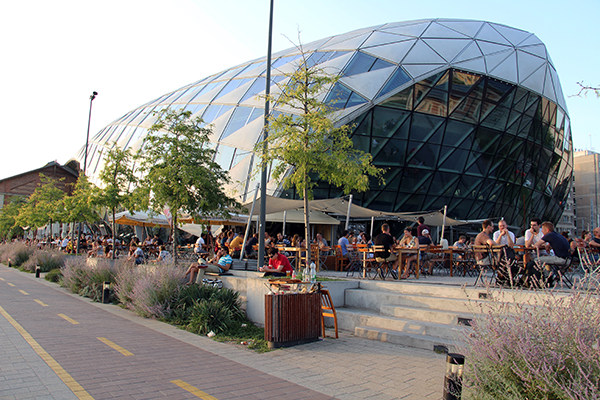
Credit: Fred Romero from Paris, France, CC BY 2.0, via Wikimedia Commons
“We don’t want to see another effort at re-educating our societies along the lines of progressive ideas promoting an endless cycle of ‘liberation.’ This has been attempted several times here in this region. We remember well. And we suffered from it direly,” said Miklós Szánthó, the director of the Hungarian Center for Fundamental Rights, the local organizer of the conference, in his CPAC Hungary 2023 speech.
Mr. Szánthó went on:
We also remember clearly that while implementing their terror, national and international socialists were busy convincing the whole world that the system they invented was ‘the best of all possible worlds.’ Today, progressives are trying to persuade us that their virtue signaling ideology — whether we happen to call it wokeness, CRT [critical race theory], liberalism, or green dogma — is the only acceptable standard. That there is no alternative. . . . Hungarians and Central Europeans smell the stench of dictatorship when we hear that only ‘liberal democracy’ is true democracy; decades ago, the same was said — by almost the same people — of ‘people’s socialist democracy.’ Come to think of it, old and new Marxists are on the same page: they remove crucifixes from walls, daydream about the ‘Internationale‘ or the ‘global village’ and think that the state is better suited to raise children than the parent.
This was echoed by Matt Schlapp, chairman of the American Conservative Union, when he told the CPAC audience:
The problem when America is not on the right path is that we don’t just screw up our own country, we try to screw up a lot of other countries. And the extent to which America is making your life more difficult, is making energy prices harder to manage and higher, trying to tell you how you should raise your children, trying to tell you that your faith is an old-fashioned patrimony, trying to tell you that you need to put away the old clothes and put on new clothes, the extent to which we do that through financial bribes and constant attacks through the media, I just want you to know that for those here at CPAC Hungary, those messages don’t represent the heart and soul of the American people.
In fact, many people in Central European countries that lived for so long under Moscow’s yoke are wondering why they fought for their individual freedoms and their country’s sovereignty only to be expected to renounce both a few decades later on the altar of European integration, political correctness, and the rights of all sorts of minorities, be they sexual, racial, or otherwise.
In 2019, Poland was the scene of an unusual number of “equality marches” organized by the LGBT lobby with support from American and Western European embassies and companies. On August 1, in a homily on the anniversary of the 1944 Warsaw Uprising, the Catholic archbishop of Kraków, Marek Jędraszewski, caused fury among the Polish and Western liberal left, when he warned about a new “rainbow plague” that he said had replaced the old “red plague:”
The red plague no longer walks on our earth, but a new neo-Marxist one that wants to conquer our souls, hearts, and minds has appeared. It is not a red, but a rainbow plague.
Just as it did in Communist times, the Catholic faith in Poland stands in the way of the new totalitarian ideologies, and the Church is the target of many attacks from the post-Communist and neo-Marxist liberal left.
The politicians of Poland’s governing party, Law and Justice, also see elements of Marxism in the new ideologies developing in the United States and Western Europe. Those ideologies, now spreading in Poland and elsewhere in Central and Eastern Europe, include in particular the LGBT ideology, which President Andrzej Duda compared to Bolshevism in 2020. While on the campaign trail for his reelection against Warsaw’s liberal mayor, President Duda said, “Today, there are also attempts to push an ideology on us and our children, but different. It’s totally new, but it is also neo-Bolshevism.”
As president, Donald Trump did not revoke Barack Obama’s 2011 elevation of gay rights to a US foreign policy priority, and his ambassador to Poland, Georgette Mosbacher, actively supported the LGBT agenda in that Catholic country. Nevertheless, Mr. Trump also seems to see a link between Marxism and the new ideologies spreading in the West. In a surprise video appearance at CPAC Hungary this year, Mr. Trump said:
We are now engaged in a historic battle with the Marxist globalists and communists all over the world. We’re fighting against barbarians who want to demolish our liberty and our traditions and everything we hold dear. . . . Keep up the fight and never waver in defense of our freedom and our civilization. We have the communists and globalists in retreat, and as long as we press confidently ahead, we will absolutely win. We’re winning now and we will close it out.
The good thing is that the feeling expressed by the former US president that conservatism and patriotism are on the rise seems to be widely shared among the European conservatives I met at CPAC in Budapest. In their eyes, this is the main reason behind the Left’s mounting hysteria on the Old Continent as in the New World.
Since his return to power in 2010 and his ensuing struggle with the Brussels elite, Hungary’s Viktor Orbán has frequently stressed the link between today’s Left in the West and old-fashioned, Soviet-style Communism. For example, in an interview with The Telegraph while on a state visit to London in 2013, he said, “The communist heritage has a marriage with the radical liberals today. That genealogy exists in Europe.” Mr. Orbán said that the family tree had passed from Communism through the “68 generation” in the West.
At CPAC Hungary this year, the Hungarian prime minister said:
Migration, gender, wokeism — these are all just variants, variants of the same virus. . . . [T]he woke movement and gender ideology are exactly what communism and Marxism used to be: they artificially divide the nation into minorities in order to foment discord between groups. This is their power base. The Hungarian conservative experiment is successful because we can detect Marxists from many miles away — indeed by smell, without even needing to see them. They pressed down on us for 50 years. Gender and woke also divide the nation into classes, and proclaim that class is more important than nation, taking precedence over belonging to the nation and taking precedence over national identity.
Mass immigration is part of the same plan, Orbán stressed, and most conservatives attending CPAC in Budapest this year would agree with his words on illegal immigration:
The essence of illegal migration is the destruction of the national community. It is to break down the cultural basis necessary for the functioning of the nation-state and to create in its place marginalized, atomized, coexisting — but mutually hostile — groups who will never form a community and who will eventually never form a state.
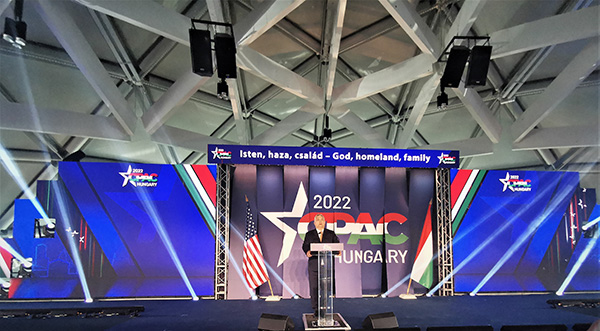
Viktor Orban speaking at CPAC Hungary 2022. Credit: Elekes Andor, CC BY-SA 4.0, via Wikimedia Commons
To be clear, race is not an important element in Central European patriotism. This is particularly true of Poland, where the First Republic — that is, the Polish-Lithuanian Commonwealth — was a multicultural, multilingual, and multiethnic state for centuries. In addition, it was the main home for Jews in Europe, which is why Nazi Germany chose Poland for its anti-Jewish campaign. Polish nationalism is mainly Christian nationalism, not race-based nationalism. And the conservatives now in power — who are rather more liberal and less uncompromisingly pro-life than the Polish nationalists — see themselves not as nationalists but as Christian democrats. They see the nationalists as their opposition on the right, competing for part of their electoral base, and they often fight them more forcefully than they fight liberals on their left.
The same goes for Hungary’s governing coalition, which is made up of Fidesz and the smaller Christian-democratic KDNP party. That Viktor Orbán and Fidesz also consider themselves Christian democrats was best made clear by the Hungarian PM in a speech to the European Parliament in early 2012. At that time, after Fidesz had been in power a year and a half, Hungary was already facing the fury of the Left, which dominated that institution. As Polish journalist Viktor Janke quotes in his well-regarded biography of Mr. Orbán titled Forward! The Story of Hungarian Prime Minister, Viktor Orbán:
Our political community must realize that the ideas we represent are unfortunately not supported by a majority, including in this House. There is no doubt that our ideals are Christian. They are based on the responsibility of the individual, positive national feelings are important to us and we see the family as the foundation of the future. Many may have a different view of these issues, but that does not change the fact that our position remains European. We may be a minority in Europe with these ideals, but these views remain European and we have the right to defend our convictions. You may not agree with the sentence I am going to quote now, but personally, I agree with Schuman when he said that European democracy will be Christian or it will not be. And that too is a European point of view!
In Hungary, the nationalists are not in power. As in Poland, they are more conservative, more pro-life, and more sovereigntist vis-à-vis the European Union than Fidesz. They were represented by the Jobbik party before it became a pro-EU, centrist party at the end of the 2010 decade, and nationalists are now represented by the Mi Hazánk (Our Homeland) party.
CPAC Hungary is therefore more or less equivalent to the American CPAC, which mainly includes conservatives with links to the Republican party and is hostile to any frank discussion of race.
Apart from the American Republican Party and the ruling Hungarian Fidesz, the other political parties and organizations that were represented at CPAC Hungary this year, as in 2022, were Italy’s Brothers of Italy (Giorgia Meloni’s party); the Northern League of former interior minister Matteo Salvini; Spain’s liberal-conservative, pro-life, sovereigntist Vox Party; France’s sovereigntist National Rally (Marine Le Pen’s party); Austria’s liberal-conservative FPÖ, and others. One notable absence was the Alternative for Germany (AfD), which has in its ranks several differing sensibilities, including true conservatives and true nationalists.
Poland’s Law and Justice party did not send a speaker to CPAC Hungary 2023 and was not represented in the panel discussions. However, a deputy minister from a smaller partner in the United Right coalition that Law and Justice heads did deliver a speech through a video link. Because many of the American and European participants at CPAC are critical of what they view as the excessive scale of Western support for Ukraine against Russia, the Poles, who are very supportive of their Eastern neighbor, probably did not feel comfortable taking part. In attendance, however, were representatives from various important Polish organizations, in particular the pro-family and pro-life Ordo luris Institute for Legal Culture.
Europe’s conservatives differ greatly from country to country. In the European Parliament, they sit in two different groups: the European Conservatives and Reformists (CRE, which includes Poland’s Law and Justice, the Brothers of Italy, and Spain’s Vox) and Identity & Democracy (I&D, which includes the French National Rally, the Italian League, the Alternative for Germany, and the Austrian FPÖ). Since it left the center-right European Popular Party in 2021, Hungary’s Fidesz has not been affiliated with any parliamentary group, and its members sit as “independent.”
Some of those parties (eg, Law and Justice, Brothers of Italy, Vox) are more Alanticist and more pro-life than others; others (eg, National Rally, Fidesz) are more focused on fighting Brussels’ hegemony and retaining national sovereignty. Nevertheless, all the parties and organizations represented at CPAC Hungary clearly see the need to work together to stop and reverse the wave of wokeness coming from America and now spreading quickly in Europe.
For example, Jordan Bardella, the young chairman of the National Rally, spoke about the dangers of wokeism and what should be done to repel that dangerous ideology. Mr. Bardella said:
[W]okeism . . . draws its source from an Anglo-Saxon cultural movement [and] is being imported today with the support of the European Union, through the modification, for example, of our language, through the introduction of inclusive writing, through the promotion of the Islamic veil in EU institutions, through the suppression of our borders, through the will to destroy our statues and to stop teaching some parts of French history.
While admitting that the concept of conservatism is not much a part of French political discourse, Mr. Bardella insisted that certain conservative ideals are — for example, sovereignty:
[We] defend the aspiration to sovereignty, and I think that we appear today as the guardians of the limits in the face of a wild, unbridled, unlimited, ultra-liberal globalization, in the face of the loss of our identity due to demographics evolving with the successive waves of migration as well as to the questioning of the bases upon which our society was founded, the woke ideology and the cancel culture, which I wanted to discuss precisely at CPAC.

Jordan Bardella (Credit Image: © Panoramic via ZUMA Press)
Mr. Bardella also observed that CPAC is a good place to make connections and alliances with friends from other countries. In particular, he said the choice of Hungary for the conference “is all the more symbolic because Hungarians have elected a patriotic government that defends the interests of its people, that proudly assumes its identity.” (It is worth noting that last year the National Rally became, for the first time in its history, the biggest opposition group in the French National Assembly. One can increasingly hear in the French mainstream media liberal-minded journalists and commentators fretting about the risk of Marine Le Pen succeeding Emmanuel Macron after the next elections.)
Brothers of Italy MEP Vincenzo Sofo, who is his parliamentary group’s rapporteur for the new migration pact being discussed in the European Parliament, offered his opinion that the attitude in Brussels toward illegal immigration is changing for the better, as an increasing number of EU member countries shift to the right. “[F]or the first time,” he said, “we see the European Commission calling for a strategy of closing borders and putting filters in places outside European borders.”
Vox MEP Hermann Tertsch, a Spaniard of Austrian descent, remarked on the importance of joining forces with conservatives in Latin America, saying:
We are fighting the same struggle. If we all stick to our values, then we will be together. . . . We can’t be tempted to make alliances just because someone is the enemy of our enemies. We have to make alliances between people sharing common values: the Republicans in the USA, but also all the conservatives in South America who are now overrun by the Foro de São Paulo, which is the combination of the communist movement with organized crime. . . . Latin America is also the West, and it’s an enormous force that needs to be with us. Through Spain and the Iberian Peninsula, we [the Europeans] have an enormous connection with Latin America. North Americans, South Americans, and Europeans should pull together in this fight for civilization.
Matt Schlapp, the American Conservative Union’s chairman, would seem to agree with that remark, having signed the Madrid Charter in 2021. Drafted by Spain’s Vox party, the Madrid Charter aims to unite efforts against left-wing totalitarianism on both sides of the Atlantic, particularly in the face of the Communist threat to the Spanish- and Portuguese-speaking world. The list of speakers at this year’s CPAC Hungary included only one figure from Latin America, though one with a well-known name: Brazilian Congressman Eduardo Bolsonaro, the son of former Brazilian president Jair Bolsonaro. Mr. Bolsonaro represents South America in The Movement, founded by Steve Bannon, and is also a Madrid Charter signatory.
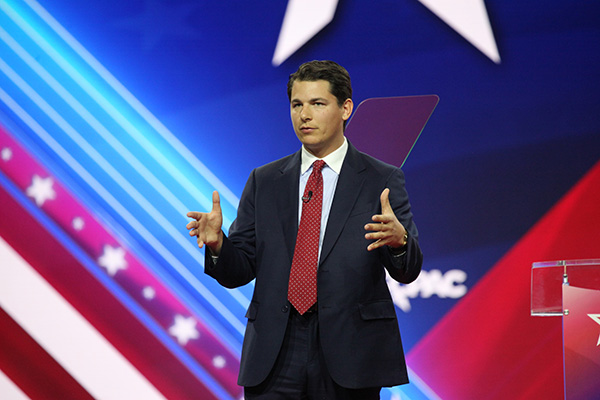
Eduardo Bolsonaro speaking at CPAC America 2023. (Credit Image: © Niyi Fote/TheNEWS2 via ZUMA Press Wire)
Though conservatism, considered broadly, is making strides in many places, it is important to remember that conservative ideals vary from country to country. As Francesco Giubilei, the director of the Italian conservative think tank Nazione Futura, told Remix News at the conference:
Let us not forget that the idea of conservatism is always linked to all the national characteristics of a given country. That is why Latin conservatism is quite different from Central European conservatism, which is itself different from Anglo-American conservatism. So, it is important to try and find some conservative values in a different manner from country to country. . . . What we should not try to do is to replace one cultural hegemony with another cultural hegemony. We must insist on the importance of freedom. A cultural counter-revolution could mean, for example, that the conservatives can have the opportunity to speak at big events that are not conservative events.
(For that matter, one thing the conservatives ruling in Poland should do immediately is to lift the ban on American Renaissance’s Jared Taylor.)
In closing, we of course must ask whether it is not already too late for Western Europe, particularly regarding demographics. Of the continent’s biggest countries, France and Germany are the ones with the greatest proportion of non-European immigrants. Already about a third of newborns in France have non-European parents, and over a fifth of the names given to infants every year are Muslim.
The situation is similar in Germany, and in both countries, it is worsening quickly. Western Europe has already undergone deep, seemingly permanent changes. By the time the participants at CPAC Hungary 2023 have the opportunity to assume power in France, Spain, Germany, Austria, Switzerland, and the Benelux, Europe will have changed even more. The only part of the continent that still has a chance to remain truly European is post-Communist Central Europe. In fact, even today, visitors coming from the West often report feeling that they are rediscovering the real Europe of decades past.
General Charles de Gaulle once said:
It is very good that there are yellow Frenchmen, black Frenchmen, brown Frenchmen. They show that France is open to all races and that it has a universal vocation. But on the condition that they remain a small minority. Otherwise, France would no longer be France. We are above all a European people of white race, of Greek and Latin culture, and of Christian religion. Let’s not kid ourselves! Have you been to see the Muslims? Have you seen them with their turbans and their djellabas? You can see that they are not French!
The general issued that warning in the late 1950s, and it has been ignored ever since.

